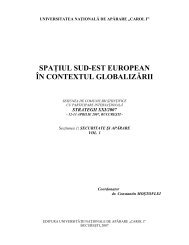PROVOCĂRI LA ADRESA SECURITĂŢII ŞI STRATEGIEI LA ÎNCEPUTUL SECOLULUI XXI
provocări la adresa securităţii şi strategiei la începutul secolului xxi
provocări la adresa securităţii şi strategiei la începutul secolului xxi
You also want an ePaper? Increase the reach of your titles
YUMPU automatically turns print PDFs into web optimized ePapers that Google loves.
Bulgaria<br />
Security problems:<br />
None.<br />
Bulgaria is NATO’s<br />
membership.<br />
armed forces [10] and in establishing control over the Pankisi Gorge near<br />
the border with Russia.<br />
Georgia wants NATO to play a role in solving the Abkhazian and<br />
South Ossetian conflicts on Georgian soil, and, in September 2002, its<br />
parliament adopted a resolution claiming the goal of NATO membership.<br />
"The United States is urging Russia and Georgia to agree on a<br />
timetable for the withdrawal of Russian forces from their bases in Georgia."<br />
The Russian regional policy still presents the continuing course of the<br />
military-political dominance in the region [11]. Russian military need a<br />
permanently explosive situation that can guarantee their permanent<br />
dominance over the situation [12].<br />
Figura 4 Bulgaria<br />
Figura 5 Georgia<br />
Georgia<br />
Security problems:<br />
About a third of the boundary with<br />
Russia remains not delimited, and none of it<br />
demarcated, with several small, strategic<br />
segments remaining in dispute.<br />
OSCE observers monitor volatile areas<br />
such as the Pankisi Gorge in the Akhmeti<br />
region and the Argun Gorge in Abkhazia.<br />
Meshkheti Turks scattered throughout<br />
the former Soviet Union seek to return to<br />
Georgia.<br />
Boundary with Armenia remains not<br />
demarcated; Ethnic Armenian groups in<br />
Javakheti region of Georgia seek greater<br />
autonomy from the Georgian government.<br />
Azerbaijan protests Georgian<br />
construction at the Red Bridge crossing and<br />
several other small segments of Armenia’s<br />
boundary, which remain unresolved until<br />
delimitation.<br />
Georgia participates in PfP.<br />
Abkhazia [7] and South Ossetia may prove to be a more significant<br />
challenge. Unlike Ajaria, they declared independence in 1990s civil wars.<br />
They consider themselves ethnically separate from the Georgian people and<br />
have their own armed forces. Ajaria, a majority-Muslim province in<br />
majority-Christian Georgia, never formally declared independence but<br />
refused to pay the Georgia government taxes or customs duties generated by<br />
its oil-exporting port of Batumi [8].<br />
U.S. programs in Georgia [9] are involved the Baku-Tbilisi-Ceyhan<br />
oil and South Caspian gas pipelines. The U.S. has assisted the Georgian<br />
285<br />
Figura 6 Moldova<br />
286<br />
Moldova<br />
Security problems:<br />
The main part of today’s Moldova lies in<br />
the historical region situated between the Prut and<br />
Dnester rivers and the Black Sea coast.<br />
In parallel-with Moldova’s process of<br />
emancipation from the Soviet centre, from 1989<br />
onwards protest movements in the regions with<br />
predominantly non-Moldovan populations, i.e. in<br />
the left bank areas and in the south of the country,<br />
began organizing themselves to resist Moldovan<br />
independence efforts. This resistance was mainly<br />
motivated by the fear that Moldova, once fully<br />
independent, would wish to reunite with Romania.<br />
In addition, a strong tendency for the preservation<br />
of the Soviet Union and of “Socialist values” was<br />
present within these protest movements, in<br />
particular among the Slav population and its<br />
leadership in the left bank areas.<br />
Moldova's economy is largely dependent<br />
on energy and raw material imports from the CIS.<br />
Although President Mircea Snegur signed the<br />
Alma-Ata Declaration in December 1991, the<br />
former Moldovan parliament was reluctant to ratify<br />
the Agreement on Moldova’s membership of the<br />
Commonwealth of Independent States, mainly due<br />
to the opposition of the Popular Front.<br />
On 8 April 1994, the Parliament ratified<br />
the CIC and Economic Union Treaty by 80 votes in<br />
favor to 18 against.<br />
Difficulties with the Transnistria region<br />
complicate controlling border crossing and customs<br />
regimes with Ukraine, despite concordance on<br />
2003 delimitation and customs protocols and<br />
OSCE assistance.<br />
Moldova participates in PfP.



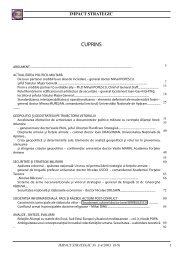

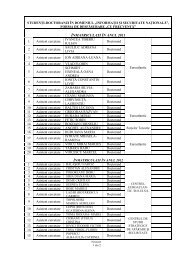
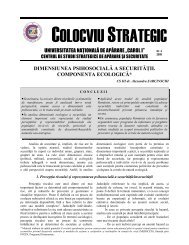
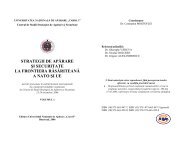
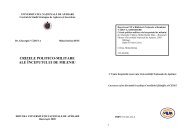
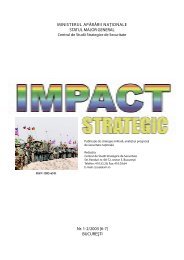


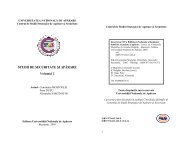
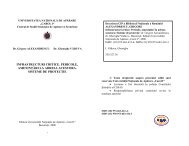
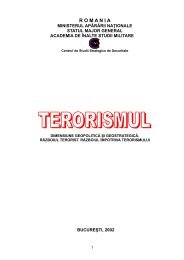
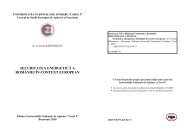
![„CAROL Nr 4 [29]/2008](https://img.yumpu.com/53801719/1/184x260/carol-nr-4-29-2008.jpg?quality=85)
